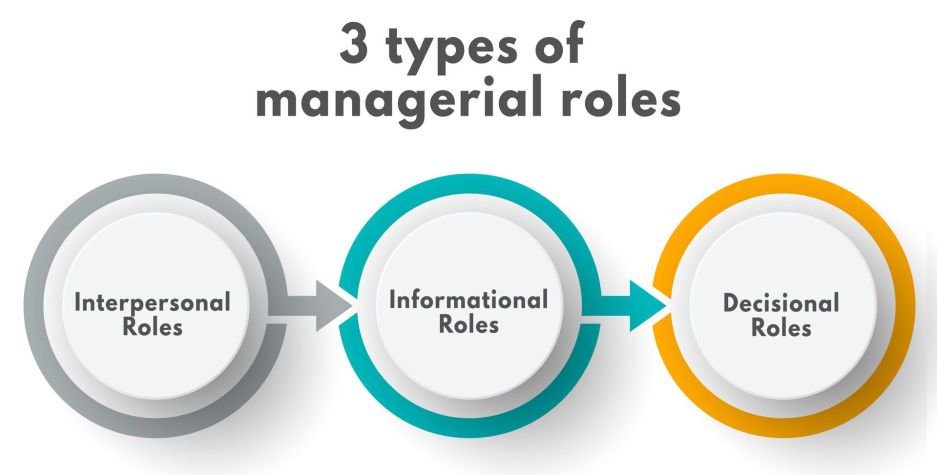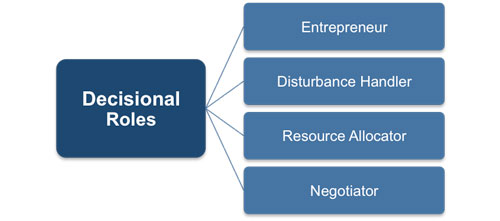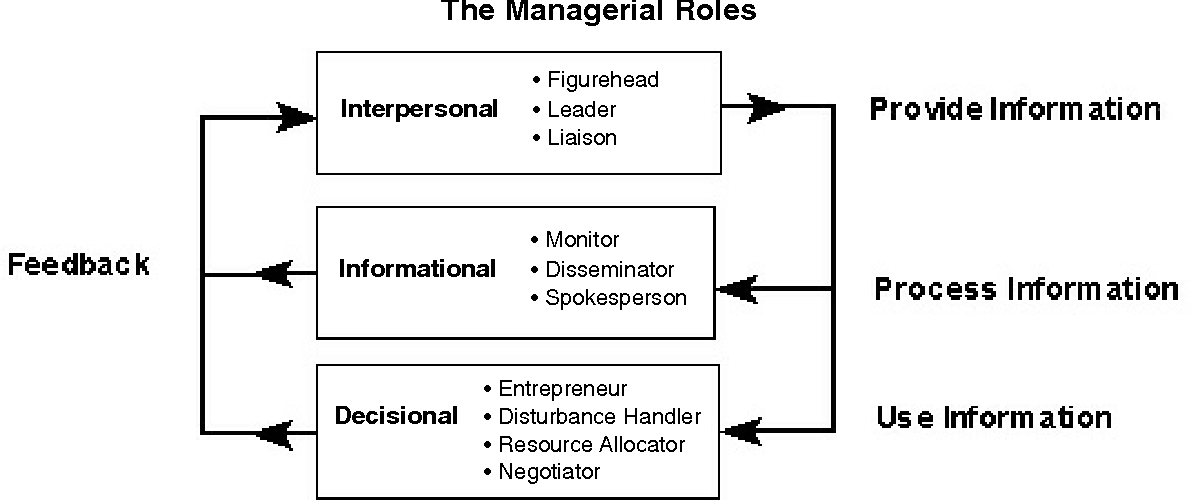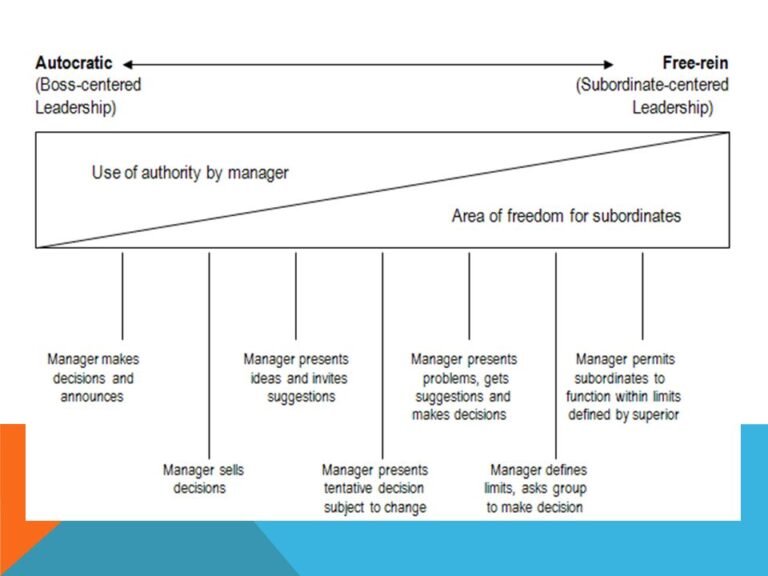Henry Mintzberg Model of Management
What is the Roles of a Manager in an Organization?
There are many roles that a manager has within an organization.
Performing these roles is the basis of a manager’s job, and to be effective at these roles, a manager must be a complete business person by understanding these strategic, tactical, and operational responsibilities that he or she holds.
While not always explicitly stated in a manager’s job description. At any given moment, a manager might have to be a coach, a problem solver, a liaison, a strategic planner, a cheerleader, a conflict manager, a trainer, a realist, an organizer, an optimist, and a decision-maker.
These roles can change from day to day, but one thing is for sure. A manager must understand all of their roles and how to perform them effectively.
This means that a manager must have a global understanding of all business functions, organizational goals, his or her level of accountability, and the appropriate way to serve both internal and external clients of the organization.
Henry Mintzberg, a professor at McGill University, spent much of his career researching the managerial roles and behaviors of several organizations presidents, chief executive officers. Henry Mintzberg wasn’t satisfied by Henry Fayol’s depiction of managers as those that engage in planning, organizing, directing, leading, and controlling.
He felt that these functions were far too vague and weren’t an accurate representation of what managers actually did on the job.
So naturally, Henry Mintzberg sought to uncover more supportable and useful descriptions of managerial work.
In addition to conducting his own research, Henry Mintzberg scoured current and available research pertaining to managerial roles.
These studies incorporated managers at all levels of the organizational structure as well as managers from different countries.
He discovered that Managers spent most of their time engaging in some specific roles. and was able to categorize these roles into three categories, including interpersonal roles, informational roles, and decisional roles.

💥🎁 New Year & Easter Deals On Amazon !
Don't miss out on the best discounts and top-rated products available right now!
🛒 Shop Now and Save Big Today!*As an Amazon Associate, I earn from qualifying purchases.
Henry Mintzberg
Who is a Manager?
A manager refers to a person who is in authority and is in charge of people and activities aimed at achieving a certain goal. The work of a manager is to lead, set goal, direct, organize and coordinate efforts of his team to accomplish its objectives through the application of available resources, such as financial, environmental, technological, and human resources
Although definitions vary, a manager can easily be described as someone who is in charge of an organization or subgroup,
And since the manager is in charge of the organization or subgroup, they’re given a certain amount of authority over the group.
Henry Mintzberg argued that this authority’s presence was important because this formal authority, meaning authority derived from simply having a certain position in the organizational structure, results in possession of status.
As a manager, you need to perform many different roles to meet your responsibilities. One minute you might be resolving a conflict between team members, and the next, you could be representing your department at a meeting.
You’re expected to restore harmony and productivity in one area and then show your technical and strategic expertise in another.
Your challenge is to acquire the skills for each role so that you can deal with every situation successfully. And this is where Henry Mintzberg’s management roles can help.
In his book, Mintzberg on Management inside our strange world of organizations. Henry Mintzberg identified ten essential roles that managers play.
Henry Mintzberg attempted to paint a much more accurate picture of managerial roles to accurately answer the question. What does a manager actually do? Here is a lost of managers Roles;
💥🎁 New Year & Easter Deals On Amazon !
Don't miss out on the best discounts and top-rated products available right now!
🛒 Shop Now and Save Big Today!*As an Amazon Associate, I earn from qualifying purchases.
- Figurehead
- Leader
- Liaison
- Monitor
- Disseminator
- Spokesperson
- Entrepreneur
- Disturbance Handler
- Resource Allocator
- Negotiator
Henry Mintzberg subdivide these roles into three distinct roles in the organization which are;
- Interpersonal Roles
- Informational Roles
- Decisional Roles
Each of these categories spawned more specific responsibilities that ultimately share a common theme.

And a manager’s status in the organization is what leads to the various roles that will describe here.
Interpersonal Roles of the Manager
Interpersonal roles are derived directly from formal authority, since managers wouldn’t have the same relationship with his or her subordinates if he or she lacked formal authority and thus status in the group
within interpersonal roles, managers fulfill three important roles, namely;
- Figurehead
- Leader
- Laison
Figurehead Role of a Manager
As a figurehead, managers are the head of the organizational unit and are responsible for performing certain ceremonial duties.
Figurehead role of a manager includes duties like taking newly hired employees out to lunch, attending the wedding of an employee, or even meeting with foreign dignitaries.
💥🎁 New Year & Easter Deals On Amazon !
Don't miss out on the best discounts and top-rated products available right now!
🛒 Shop Now and Save Big Today!*As an Amazon Associate, I earn from qualifying purchases.
Although these may not sound critically important to the organization, they ensure the organization runs smoothly.
Leader Role of a Manager
The next role is that of a leader as a leader. Managers are accountable for the work and performance of their subordinates.
Managers are often responsible for hiring and training in their direct area and also providing subordinates with incentives to increase productivity while working towards group goals.
Liaison Role of a Manager
The last interpersonal role is that liaison managers serve as a connection between their organization or sub-unit to those outside of it.
Acting as a liaison leads to managers establishing contacts with their peers as well as customers and suppliers, which can serve as a valuable source of information.
Each of the individual roles within interpersonal roles leads to the second role of a manager.
Informational Roles of a Manager
Through their interpersonal roles, managers develop important contacts that provide them with access to important information.
Within their informational role, managers serve as a
- Monitor,
- Disseminator
- Spokesperson
Monitor Role of a Manager
As a monitor, managers are responsible for scanning their environments for information. This information can come from a manager’s vast collection of networks and can either be solicited or unsolicited.
The important thing is that the manager has their ears to the ground and is waiting for valuable information to relay to their subordinates.
💥🎁 New Year & Easter Deals On Amazon !
Don't miss out on the best discounts and top-rated products available right now!
🛒 Shop Now and Save Big Today!*As an Amazon Associate, I earn from qualifying purchases.
Disseminator Role of a Manager
Once the manager collects this information there now, in a position to disseminate that information to their organization or subunit.
This action highlights a manager’s role as a disseminator. Without the manager, subordinates wouldn’t have access to this information since they likely lack the vast network of contacts that managers possess.
Spokesperson Role of a Manager
The last informational role of a manager is that of a spokesperson. In addition to disseminating information to those inside the organization or subunit, managers also said information to people on the outside.
This could take the form of a conference call with investors, a testimony at a congressional hearing, or even a conversation with a supplier.
In addition to managing their subordinates’ interests, managers must also deal with external stakeholders such as investors, suppliers, creditors, and government agencies, to name a few.
Decision Making Role of a Manager
Due to their informational roles, managers now have access to what is needed to make decisions.
Managers play a significant role in the decision-making of their organization or subunit. This is largely due to the level of information that they have access to within a manager’s role as a decision-maker.
They also serve as an;
- Entrepreneur,
- Disturbance Handler
- Resource Allocator
- Negotiator

Entrepreneur Role of a Manager
As an entrepreneur, managers seek to utilize their information for the purpose of improving their organization or subunit.
Remember that while serving as a monitor, the manager is scanning the environment for information and opportunities.
💥🎁 New Year & Easter Deals On Amazon !
Don't miss out on the best discounts and top-rated products available right now!
🛒 Shop Now and Save Big Today!*As an Amazon Associate, I earn from qualifying purchases.
As an entrepreneur, the manager now takes advantage of those opportunities that were previously identified.
Disturbance Handler Role of a Manager
As disturbance handler managers are responsible for responding to events or circumstances that are beyond their control.
These circumstances or pressures are typically too significant for a manager to ignore, and thus some kind of action is needed.
These pressures can include deteriorating economic conditions, labor strikes, natural disasters, competitors, actions, or even product issues like the Firestone tires in the 1990s, the deaths caused by Tylenol in the early 19 eighties, and, more recently, the BP oil spill.
A disturbance handler is a decisional time. When a team hits an unexpected roadblock, it’s the manager who must take charge to mediate any disputes.
These events’ impact is significant and certainly warrants a response for managers in their disturbance handler role.
Resource Allocator Role of a Manager
The third decisional role that managers engage in is that of a resource allocator as resource allocator managers decide who in their organization or sub-unit gets what.
This can include things like time, which is important considering the manager’s connections and access to information, money, equipment, or even facilities.
In addition to allocating scarce resources is managers also established an organizational structure for their unit and authorized decisions before implementation.
Negotiator Role of a Manager
The fourth and final decisional role is that of a negotiator due to their authority to commit organizational resources and their access to information. Managers are uniquely positioned to negotiate on behalf of the organization.
💥🎁 New Year & Easter Deals On Amazon !
Don't miss out on the best discounts and top-rated products available right now!
🛒 Shop Now and Save Big Today!*As an Amazon Associate, I earn from qualifying purchases.
Managers regularly negotiate supplier contracts, employee grievances, and employee labor contracts.

Together Henry Mintzberg argued that each of these ten managerial roles provides a better reflection of what managers actually do.
Each role is uniquely important, and some of these managerial roles are certainly greater than the individual roles by themselves.
Take, for example, a manager who doesn’t have access to information. How would they make accurate and timely decisions?
How would they allocate resources is negotiating effectively, or even identify new opportunities for their organization?
The truth is that each managerial role is necessary and important to ultimately the manager’s effectiveness.
Henry Mintzberg certainly didn’t claim that every manager gives each role the same attention. Each manager’s access to each was important for a manager to fulfill their roles and responsibilities effectively.
Mintzberg Management Roles with Example
To better understand these roles, let’s look at how they are applied by Bernard, the Boss, as he goes through his daily routine as a manager at a local grocery store.
Let’s look at how these three roles were played out by Bernard when Bernard arrived at the store in the morning.
💥🎁 New Year & Easter Deals On Amazon !
Don't miss out on the best discounts and top-rated products available right now!
🛒 Shop Now and Save Big Today!*As an Amazon Associate, I earn from qualifying purchases.
Bernard as a Figurehead
He holds a daily meeting for all employees who are working that day. He spends time talking about daily specials, sales goals and motivates his employees for the day by holding a friendly contest between the workers to try to sell us many of the sale items are possible.
During their shift, he informs his employees that the highest seller will win a $50 gift certificate for the store.
As a figurehead, Bernard, the boss, has certain social, ceremonial, and legal responsibilities that his employees expect him to fulfill.
Bernard is seen as a source of inspiration and authority to his employees.
As a Leader
As Bernard goes about his day, he must make sure that he’s monitoring the performance of his employees and how well they’re doing in their sales.
He checks with his employees periodically to make sure that they understand the products that are on sale and what key features to point out, as well as to remind the mother goal of winning the contest.
Bernard, the boss’s role as a leader, requires him to direct and manage the performance of his employees.
He will spend time communicating performance goals, training and mentoring employees, supporting employees’ efforts, supplying resources, evaluating employee performance, and motivating employees towards a higher level of productivity.
Liaison Role
Bernard does not leave all the selling up to his employees because he likes to maintain contact with his customers to better understand their needs and how he can accommodate them.
He stops and chats with several customers throughout the day to get feedback on sale items and to learn about the products that his customers would like to see the store put on sale in the future.
Acting as a liaison Bernard communicates with internal and external members of the organization. This networking activity is a critical step in reaching organizational goals, especially those concerned with customers.
Spokesperson Role
After Bernard is comfortable with his employees understanding of sales products and their goals, he heads back to his office to do some research for what he will put on sale next week.
Bernard spends time reflecting on the feedback his employees gave the information his customers shared within that day, and he also looks at what his competitors are putting on sale at this time.
The monitor role that Bernard the boss must fill involves the task of researching, locating, and choosing useful information.
As a monitor, Bernard has to stay abreast of current industry standards and changes occurring in both the internal and external business environments. This also includes monitoring the performance of employees and their level of productivity.
Disseminator Role of Manager
Bernard combines all of the information into a proposal for next week’s sale advertisement and forwards the information to upper management for approval. He also spends some time reviewing this information with his employees to begin to familiarize themselves with the items. As a disseminator, Bernard must take the information he gathered as a monitor and forward it to the appropriate individuals.
Spokesperson Role
Now that Bernard has approval from upper management, he creates the advertisement for next week’s sale items and distributes them to his customers. Acting as a spokesperson on behalf of the organization is Bernard’s final informational role. As a spokesperson, Bernard communicates information about the organization to outside parties.
Entrepreneur Role
Bernard checks in with his employees at midday and notices that some of the sale items have not done as well as anticipated. After speaking with his employees, he learns that the things that have not been selling are sitting next to the shelves’ generic brand. These generic brands are still less expensive than the sale items and are causing customers to choose the less expensive version.
Bernard decides to move these items to a particular display area to sit by themselves and hopefully attract more buyers. As an entrepreneur, Bernard the Boss is focused on process improvement. He looks for ways to improve productivity and efficiency within his organization and directs the change process from development to implementation.
Disturbance-Handler Role
As Bernard is setting up the display, he notices two of his employees arguing over the contest, and he is not the only one. Customers have also seen, and some are starting even to leave the store. Bernard quickly intervenes and helps to bring the employees to an agreement. Acting as a disturbance-handler, Bernard serves as a conflict manager. He spends time taking corrective action during times of dispute to remove any barriers toward organizational success.
💥🎁 New Year & Easter Deals On Amazon !
Don't miss out on the best discounts and top-rated products available right now!
🛒 Shop Now and Save Big Today!*As an Amazon Associate, I earn from qualifying purchases.
Resource-Allocator Role
After the display is set up, Bernard heads back to his office and sees that he has a voicemail. After checking the voicemail, he learns that one of his employees who works the night shift has called out sick. He needs to cover that shift and quickly ask employees who are currently working if they would mind working a double shift. He finds a replacement and is then able to go back to his daily responsibilities. Determining the best place for organizational resources to be distributed is what Bernard does in his role as a resource-allocator. Taking the time to plan, dispense and monitor resources is essential for Bernard to ensure that his employees continue to be productive.
Negotiator Role
Bernard, the Boss, ends his shift with a conference call with one of his distributors. He learns that the store will now be charged an additional $300 for each delivery. Bernard knows that he has to adhere to a set budget based on the old delivery fees. He spends some time negotiating with the distributor and compromises that the additional cost will not be charged until next quarter when he can account for it in the budget. The negotiator role is the last of the decisional roles that Bernard must fill. As a negotiator, Bernard acts as a representative for the team, department, or organization during negotiation times, whereby he looks out for the best interests of the party he represents.



